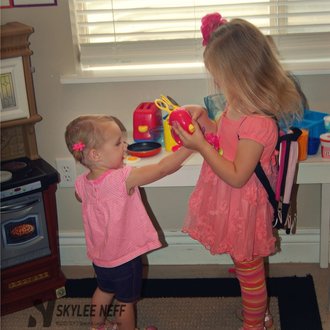Here are some ideas to try to help your child talk. These are great for those 1 year olds who mostly "point and grunt", because as fun as that stage is...it is really not much fun.
Parent Speech:
Use clear simple speech with your child during play routines. The goal is to talk in phrases you want your child to copy – 1 to 2 words.
Example: Instead of saying “Go down the hall and get your shoes” say “Get your shoes”. When getting undressed use short phrases “Shoes off…shirt off…etc.” Try to use grammatically correct phrases, just shorter ones.
Echo-Expansion Modeling:
Add 1 or 2 words to what your child says when you respond back to him or her.
Example: When your child says “up” say “up… you want up”.
Don’t Anticipate Your Child’s Needs or Wants:
Mom's and dad's are great at knowing what their kids want or need. BUT mind-reading doesn't give your child a change to use words and ask. Don’t anticipate your child’s every need or want before they have a chance to make them known to you.
Example: When you know your child wants a drink – instead of just handing them the drink, point and wait to see if they will request it (pointing, signing, or saying “drink”).
Sabotage the Environment:
Mess up routines so your child has to communicate his or her needs.
Example: During mealtime give everyone a spoon but “forget” to give your child a spoon. Wait and see if your child initiates they need something. If they don’t initiate what they need, help them by saying. “What do you need?” or “Are you missing something” or “Uh-oh!” Label the item before you give it to them.
Play “dumb” when your child points to a desired object.
Example: When your child points to the counter for their drink (or another desired object you know they want), say: “What do you want?” (pause) “A spoon?” (pause) “An apple?” (pause) “A drink?” …. “Oh, Drink!”
Self-Talk:
When your child is within hearing range, talk about what you are doing while you do it.
Example: When washing your hands at the sink say “wash hands”, when the phone is ringing say “I hear the phone”.
Parallel Talk:
When playing with your child, describe what your child is doing while they are doing it.
Example: When your child picks up a car – say “pick up car”. When your child drops a block – say “drop block”.
Describe what he is seeing and hearing.
Example: “That’s a ball”, When listening to music say “Music, listen to music”
My advice: take one or two ideas and try them out. Remember when working with kids the idea is not to frustrate them more, but to model how they could do something differently. Waiting for them to talk works wonders...demanding that they talk can really backfire. Try to keep things light and fun and find ways to repeat, repeat, repeat!
Parent Speech:
Use clear simple speech with your child during play routines. The goal is to talk in phrases you want your child to copy – 1 to 2 words.
Example: Instead of saying “Go down the hall and get your shoes” say “Get your shoes”. When getting undressed use short phrases “Shoes off…shirt off…etc.” Try to use grammatically correct phrases, just shorter ones.
Echo-Expansion Modeling:
Add 1 or 2 words to what your child says when you respond back to him or her.
Example: When your child says “up” say “up… you want up”.
Don’t Anticipate Your Child’s Needs or Wants:
Mom's and dad's are great at knowing what their kids want or need. BUT mind-reading doesn't give your child a change to use words and ask. Don’t anticipate your child’s every need or want before they have a chance to make them known to you.
Example: When you know your child wants a drink – instead of just handing them the drink, point and wait to see if they will request it (pointing, signing, or saying “drink”).
Sabotage the Environment:
Mess up routines so your child has to communicate his or her needs.
Example: During mealtime give everyone a spoon but “forget” to give your child a spoon. Wait and see if your child initiates they need something. If they don’t initiate what they need, help them by saying. “What do you need?” or “Are you missing something” or “Uh-oh!” Label the item before you give it to them.
Play “dumb” when your child points to a desired object.
Example: When your child points to the counter for their drink (or another desired object you know they want), say: “What do you want?” (pause) “A spoon?” (pause) “An apple?” (pause) “A drink?” …. “Oh, Drink!”
Self-Talk:
When your child is within hearing range, talk about what you are doing while you do it.
Example: When washing your hands at the sink say “wash hands”, when the phone is ringing say “I hear the phone”.
Parallel Talk:
When playing with your child, describe what your child is doing while they are doing it.
Example: When your child picks up a car – say “pick up car”. When your child drops a block – say “drop block”.
Describe what he is seeing and hearing.
Example: “That’s a ball”, When listening to music say “Music, listen to music”
My advice: take one or two ideas and try them out. Remember when working with kids the idea is not to frustrate them more, but to model how they could do something differently. Waiting for them to talk works wonders...demanding that they talk can really backfire. Try to keep things light and fun and find ways to repeat, repeat, repeat!


 RSS Feed
RSS Feed
